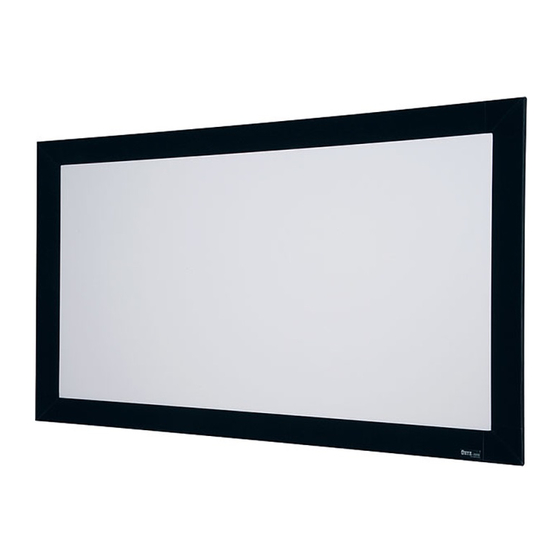Draper Onyx Istruzioni per il montaggio - Pagina 2
Sfoglia online o scarica il pdf Istruzioni per il montaggio per Schermo di proiezione Draper Onyx. Draper Onyx 2. Permanently tensioned projection screen
Anche per Draper Onyx: Istruzioni per il montaggio (2 pagine), Istruzioni per il montaggio (2 pagine)

Onyx by Draper
Surface Preparation
1 Move frame assembly out of the way, unroll viewing surface and place on
smooth/clean surface. Orient viewing surface so that folded side of hem is
visible.
2 Insert plastic tubing inside pocket formed by hem on all 4 edges of viewing
surface (see Fig. 8).
3 Carefully slide surface retention extrusion (rounded edge visible) along
hem and onto surface on all 4 edges of fabric (see Fig. 9).
not allow fabric to snag on end of extrusion. If the screen
fabric is not parallel with the surface retention extrusion, then
it may slit and tear during installation.
Please Note: To make this step easier, pinch the end of the pocket closed
before sliding it into the surface retention extrusion.
Surface Retention
Extrusion
Plastic Tubing
Back of
Viewing Surface
4 Surface retention extrusion should extend beyond edge of viewing surface
equally at both ends.
5 Verify that all surface retention extrusions are installed with rounded edge
visible and are centered on surface material.
Surface to Frame Assembly
1 Return frame onto clean surface, face down, and drape completed surface
assembly over completed frame profile with rounded edge of surface
retention extrusion visible.
2 Insert any side of surface to notch #1 on corresponding side of frame
extrusion (see Fig. 10).
Viewing
Surface
Fabric Attachment Extrusions
3 Insert opposite side of surface to notch #1 of frame extrusion.
4 Repeat steps 2-3 with remaining edges of surface.
5 Ensure surface retention extrusions are centered lengthwise in tension
slots on all 4 edges of surface.
6 If additional tension is desired or required over time, adjust surface one
edge at a time to tension notch #2.
Please Note: It is not necessary to adjust more than one edge at a time to
increase surface tension.
Figure 8
Caution: Do
Back of
Viewing Surface
Figure 9
Surface
Retention
Extrusion
Figure 10
www.draperinc.com
Mounting Screen to Wall
1 Determine height at which screen is to be mounted.
Please Note: Top edge of screen frame will be located 1" above mounting
bracket hole centerline when mounted to wall.
2 Mark hole centerline so that both wall brackets can be mounted parallel
and at equal height.
3 Install wall brackets so that the outermost edges are safely within overall
length of the aluminum frame extrusion to allow for minor horizontal screen
adjustments. Installer is responsible for providing attachment hardware.
4 Position screen slightly above Z-brackets on wall (see Fig. 11).
Wall
Wall brackets
supplied with
screen. Installer is
responsible for
ensuring appropriate
screws/bolts are used.
5 Lower screen until it engages over wall brackets. Center screen horizontally
on brackets as necessary.
Please Note: Make sure screen is installed level.
Corner Reinforcement Kit
A Corner Reinforcement kit is required for flown screens. Corner gussets
may only be installed after screen is otherwise completely assembled
(including surface).
1 Install frame per Onyx instructions.
2 Align corner gusset plate to frame.
3 Install the supplied #10-24 x .250" fastener (A) into tapped hole in corner
bracket.
4 Align corner gusset plate parallel with the outer edges of the frame.
5 Drill one hole through frame (using holes in gusset plate as a guide) with
/
" or #30 drill bit.
1
8
6 Install one of the #8 x .750" self-threading fasteners (B) into the hole, and
tighten completely to set the plate in position.
7 Drill the remaining three holes using the gusset plate as a guide.
8 Install the remaining three #8 x .750" self-threading fasteners (B) and
tighten completely to set the plate in position.
Repeat the above steps on the remaining three corners of the screen.
Onyx Frame
Onyx (Exploded Rear View)
—Side Detail*
*Viewing surface is approximately ¼" from wall.
(765) 987-7999
Page 2 of 2
Figure 11
B
B
A
B
B
Figure 12
